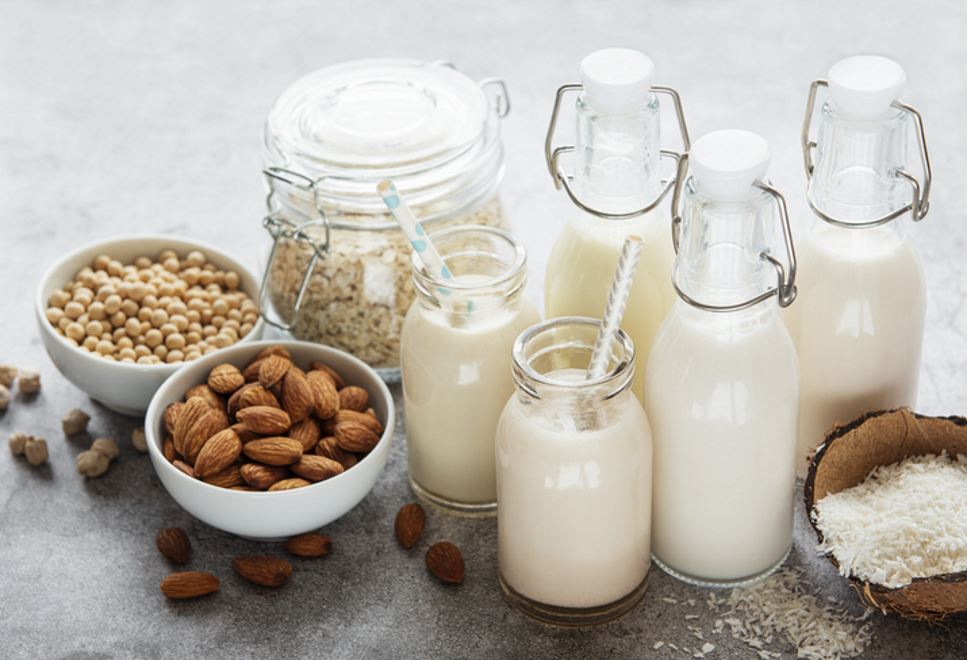What Is Plant-Based Milk?
Plant-based milks are dairy-free alternatives to cow’s milk. Some common types are made from almonds, cashews, coconut, oats, peas, rice and soy.
Each type of plant-based milk has a unique flavor and varies in the nutrients it provides. Most plant-based milks are made by soaking the main ingredient in water before grinding it into a puree and straining. The liquid is combined with other ingredients, such as water, sugar, thickening agents and vitamins or minerals.
Plant-based beverages are a popular option for individuals who can’t or don’t drink dairy milk. This may be due to milk allergies, lactose intolerance or following a vegan diet. Some people also may prefer the flavor of nondairy milk. However, these beverages should not be used as infant formula or introduced to a child before they are 1 year old.
How Do Plant-Based Milks Compare to Cow’s Milk?
One 8-ounce cup of nonfat cow’s milk provides about 80 calories, 8 grams of protein and 300 milligrams of calcium. Cow’s milk also provides potassium, vitamin B12 and is often fortified with vitamin D. Cow’s milk contains naturally occurring sugar called lactose — but flavored varieties, like chocolate or strawberry milk, may also have added sugar.
Plant-based beverages vary in their nutritional content, however, calcium-fortified soy milk is the most comparable to cow’s milk. Whether you drink soy milk or another type of nondairy beverage, it’s important to check the Nutrition Facts label to compare what nutrients are provided and if it’s right for you.
Nutrients to Consider
There are some large differences in the nutrients plant-based milks provide. These often depend on what the beverage is made from and if it’s sweetened. Some helpful nutrients to look at include:
- Calories: An 8-ounce serving can range from 30 to 130 calories among the different types of plant-based milk.
- Protein: Soy milk and beverages made from pea protein tend to have a higher protein content than other types of plant-based milk.
- Saturated fat: Plant-based beverages are often lower in saturated fat than whole milk, but may be higher in saturated fat than non-fat milk.
- Added sugars. Many brands have both a sweetened and unsweetened version of their products which provide different amounts of added sugar.
- Calcium. Many plant-based beverages are fortified with calcium, but it’s important to check the Nutrition Facts label, as some are not.
- Vitamin D. Unlike cow’s milk, fewer types of plant-based milk are fortified with vitamin D.
- Potassium. Plant-based milks are often lower in potassium than cow’s milk.
- Vitamin B12. Not all plant-based beverages are fortified with vitamin B12, which is naturally occurring in cow’s milk.
When it comes to choosing between plant-based milks and cow’s milk, the best choice will depend on what beverage helps you meet your nutrition needs.
Ways To Use Plant-Based Milk
Plant-based milk can be used in many of the same ways as cow’s milk. You can drink it as a beverage, blend it into smoothies, bake it into breakfast dishes or use it in desserts. Also try mixing it into curries or use it as an ingredient in creamy soups.
If you’re new to using plant-based milk, look for recipes that call for them in the ingredient list, as these have already been tested. You also can use plant-based milk in place of cow’s milk in many recipes, but because each type of plant-based beverage has a unique flavor and texture, you may want to experiment with which one you use.
References
Find a Nutrition Expert
Looking for credible nutrition information and recommendations? The Academy of Nutrition and Dietetics' network of credentialed food and nutrition practitioners are ready to help!

